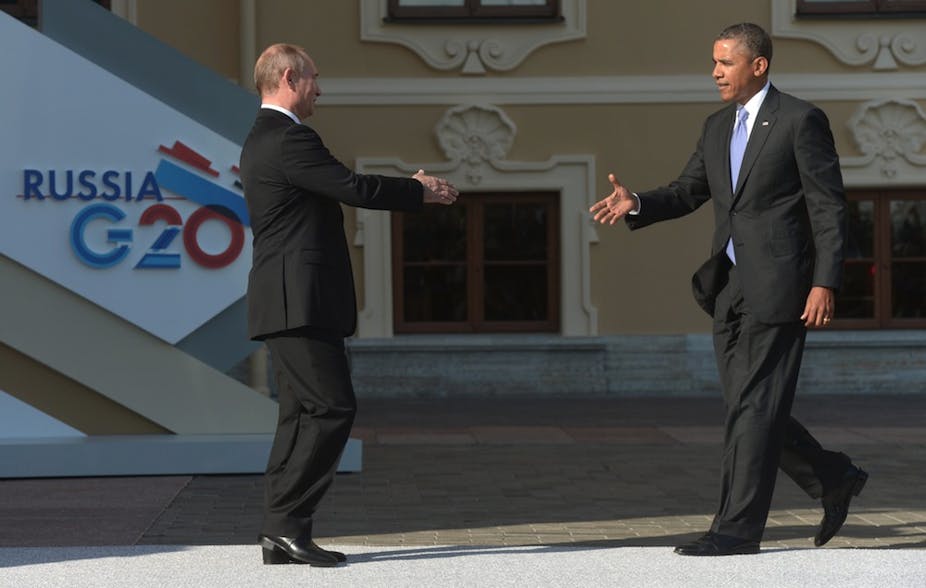G20 leaders are gathering at the Constantine Palace in St Petersburg today to hold a series of discussions and finalise the Action Plan. The International Media Centre is buzzing with nearly 3,000 members of the international press.
The atmosphere is very tense here in the lavish pavilions. Hopes are high for renewed vigour and action on the global economic agenda, even while debates on Syria and strained bilateral relations swirl around the St Petersburg Summit.
Follow the G20 leaders’ twitter streams here.
A lot of the media coverage about the issue of Syria misconstrues what type of forum the G20 Summit is. The Security Council, where Australia has assumed the Presidency this week, is the appropriate place to discuss issues of international peace and security under the UN Charter. Do we want an unelected body like the G20 taking security decisions?
Surely the G8 has been roundly criticised in this regard? Changing the scenery does not change the issues that have blocked progress over the last two years in the Council on Syria but could also be disastrous for global governance if the G20 took over the UN Security Council’s role as an unelected body.
But on the sidelines, leaders, which include the Permanent Five Security Council members, can work on blockages to action on humanitarian access and use of chemical weapons in Syria. Humanitarian actors such as Oxfam are urging leaders to take the opportunity to reopen discussions. UN Secretary-General Ban-Ki Moon is urging a new peace conference.
Just talking about global economic issues where there has been a year of carefully constructed talks and negotiated agreements may be too much to hope for. There is serious diplomatic strain between many countries here, not just the USA and Russia. There is also fallout from NSA spying allegations between the US and EU countries, Brazil and Mexico.
But there is still hope for an action-oriented Action Plan tomorrow with new language on inclusive growth and a focus on employment, investment, anti-corruption and transparency, all of which are crucial for Australia as a leading economic nation and the next host.
The headline is probably tackling corporate tax evasion. If the G20 leaders can really make progress as expected on base erosion and profit-shifting under the OECD’s modest plan, it could be incredibly important for both the domestic revenue of G20 nations and for developing countries, especially Africa.
As the country designated to host next year’s summit, Australia has attracted some adverse comment among local press and officials for its low-key presence, with prime minister Kevin Rudd absent contesting final stages of the federal election. It is the second year in which Australia has not sent a leader, designating foreign minister Bob Carr.
The timing of opposition leader Tony Abbott announcing he would cut Australia’s foreign aid growth by A$4.5 billion if he wins the election jars with Australia’s message of its strong economic good news story and international leadership role, with Carr giving a very utilitarian response about security.
There are very few Australian journalists attending to give context to the Australian Summit next year. The government will have to work hard from 1 December to build momentum.
So right now, on a sunny Autumn day in St Petersburg, staring out over the Gulf of Finland, Putin is about to open the Summit. The Russian Sherpa Ksenia Yudaeva laid out the program, where the leaders will begin with a review of the global financial situation. The leaders will then consider financial reforms developed by OECD, tax reforms, and global financial architecture.
After a working dinner, the leaders will hear UN General Secretary Ban-Ki Moon present on MDG progress and post 2015 Development Agenda. (Hopefully he can explain why the Security Council is important).
Finally, the leaders will consider anti-corruption actions and chart progress on the two-year plan from Mexico summit.
Somewhere in the grounds of the palace and the gilt corridors, these leaders must make their own peace and agree on at least one crucial global agenda this week.
Susan Harris Rimmer is attending the G20 Leaders Summit in St Petersburg and will be a media correspondent for The Conversation.
Follow her on Twitter for all the breaking news from the Summit: @femint

